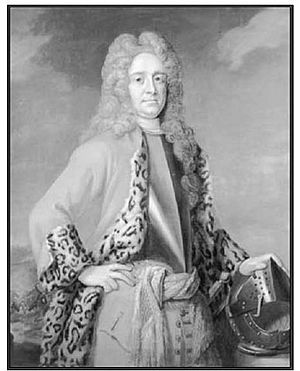Robert Hunter (colonial administrator) facts for kids
Quick facts for kids
Robert Hunter
|
|
|---|---|

Portrait of Robert Hunter (attributed to Sir Godfrey Kneller)
|
|
| Lieutenant Governor of Virginia | |
| In office 1707 – Captured at sea by the French; never served |
|
| Monarch | Anne |
| Preceded by | Edmund Jenings, President of Council |
| Succeeded by | Alexander Spotswood |
| 3rd colonial governor of New Jersey | |
| In office June 1710 – 1720 |
|
| Monarch | |
| Preceded by | Richard Ingoldesby (Lt. Governor) |
| Succeeded by | Lewis Morris, President of Council |
| 19th colonial governor of New York | |
| In office June 1710 – 1719 |
|
| Monarch | |
| Preceded by | Richard Ingoldesby (Lt. Governor) |
| Succeeded by | Pieter Schuyler, Acting Governor |
| Governor of Jamaica | |
| In office 1728 – March 1734 |
|
| Monarch | George I |
| Preceded by | John Ayscough, President of Council |
| Succeeded by | John Ayscough, President of Council |
| Personal details | |
| Born | 1666 Edinburgh, Scotland |
| Died | 31 March 1734 Jamaica, West Indies |
| Occupation | Military officer, governor, playwright |
| Signature |  |
Robert Hunter (1666–1734) was an important British official. He served as a military officer and later became a colonial governor. He was in charge of New York and New Jersey from 1710 to 1720. Later, he was the governor of Jamaica from 1727 until 1734.
Contents
Robert Hunter's Life Story
Early Years and Joining the Army
Robert Hunter was born in 1666 in Edinburgh, Scotland. His grandfather was the twentieth Laird of Hunterston. Robert was the son of James Hunter, who was a lawyer.
He first started learning to be an apothecary, which is like a pharmacist. But he decided to run away and join the British Army. He became an officer in 1689. Over time, he rose through the ranks to become a general.
A Governor's Journey
In 1707, Robert Hunter was chosen to be the Lieutenant Governor of Virginia. However, his journey there took an unexpected turn. A French privateer (a type of pirate) captured his ship. He was taken to France.
In 1709, he was set free in an exchange. He was traded for the French Bishop of Quebec. After this, he was appointed Governor of New York.
Leading New York and New Jersey
In 1710, Hunter sailed to America to begin his new role. He brought 3,000 Palatine refugees with him. These people were settlers looking for a new home.
Hunter believed in honest and clear communication. He once told the New Jersey Assembly, "If honesty is the best policy, plainness must be the best oratory." He thought that the government and the people should work together. He said, "The true Interests of the People and Government are the same."
In 1715, he suggested that the colonies should make their own copper coins. However, the king in Britain did not agree to this idea.
Later Life and Legacy
Robert Hunter's time as governor of New York ended in 1719. Pieter Schuyler took over as acting governor for a short time. Then, William Burnet became the new governor.
Hunter then became the Governor of Jamaica in 1727. He served there until he passed away on March 31, 1734. While in Jamaica, he faced challenges. He led a war against the Jamaican Maroons, but it was not successful.
Hunter was also a member of the Society for the Propagation of the Gospel. This group worked to spread Christianity. In May 1709, he was elected a Fellow of the Royal Society. This is a very old and respected group for scientists.
A Playwright Too!
Besides his military and political career, Robert Hunter had another talent. He wrote a play called Androboros. This play was written in 1714. It is important because it was the first known play to be written and published in the British Colonies of North America.
 | Anna J. Cooper |
 | Mary McLeod Bethune |
 | Lillie Mae Bradford |

